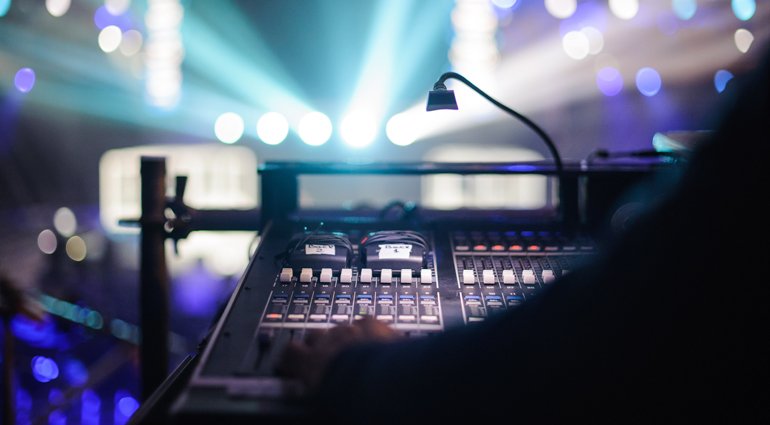
The Soundcheck, for those of you who don’t know, is a process that every band or performer has to go through before a concert. The aim of this process is to find the best onstage mix, according to the specific gear, voices, and dimensions/characteristics of the room. The sound check can be analysed from at least two different perspectives: the FOH (front of house) sound engineer and the musicians themselves, on stage. Ideal results are achieved when both sides work together sensibly and as a team. For optimal results one should stick to a few rules. Here are a few tips on how musicians can help the sound engineer:
1. Leave problem sources at home
A very common mistake is to bring problem sources (or problematic gear) to the stage. The backline (amps lining the back of the stage) should be checked for crackling cables and faulty components, and this needs to be done before the actual soundcheck, either at home or in the rehearsal room. Locating and eliminating problem sources can cost lots of unnecessarily time. Time is something that both the sound engineer or the band don’t have, especially if the band arrives late for soundcheck (which happens more often than we’d like to admit).
2. Secret to success: punctuality
Usually, there is only a short window of time for sound check, especially for shows where several bands will be performing. There is no way to predict how long it will take to get the perfect mix for a band because every band’s gear and dynamics are different. This makes it all the more important that all band members arrive on the dot. Time that you waste in the beginning will bite you in the end. The worst scenario is having to play a show with a terrible mix, due to a rushed soundcheck.
3. Keep order and keep silent
Keep in mind that not all instruments can be checked / EQ’ed at once. While the sound engineer is focusing on one instrument, all the other performers need to remain silent. Don’t restlessly fidget with your instrument unless you want to waste time. It is also counterproductive to complain and state that you are annoyed by the ten-minute kick drum check! The sound engineer knows (or should know) what he/she is doing and the more of a perfectionist they are the better for your band’s success (and your audience’s ears).
4. Suitable “material” for the man at the desk
Being prepared is most important of all, both for the individual check and for the whole band’s mix. The engineer depends on “real material” to be played during a soundcheck. It should be performed the same way now as it will be during the show. The vocalist(s) for example should sing at full volume and pronounce the lyrics like they will be pronounced during the concert. So make sure to play a song where all instruments and vocals are present so that the sound guy (or gal) know what to expect.
5. Keep eye contact
If you remain in the line of sight with the sound engineer you can communicate with him/her during the show. Co-ordinated communication is now the key, and it is to a large extent non-verbal as you play. Experienced FOHs are used to noticing and responding to looks and hand signals. The same goes for experienced musicians.
6. Avoid feedback loops
The live reference volume does not mean that everyone should play as loudly as possible with the amps cranked to 11 (I mean 10). You have to be sensible with your individual volume control. You are required to make sure that you don’t go above a volume level that will cause the microphones and monitors to feed back. This is something that could be tested during soundcheck so that feedback doesn’t occur during your actual set. Please be considerate of your audience’s hearing, and consequently, of them coming to see you perform again in the future.
7. Give concise instructions
You can give the the sound engineer a list of instructions, desired sounds or a list of sequences for the performance. He/she will be grateful for this but only if it’s really short and concise! If it is unnecessarily elaborate the engineer will most likely disregard it. They will not read a novel about your ideas for the show, so keep it in point form and very short. They will only implement what is understood, so make it clear and to the point!
8. Soundcheck is not a rehearsal
If you really need to practice something again, the soundcheck is the most unsuitable situation. Its aims are settings the levels, frequency spectrum, effects and more. A complete song does not help the sound engineer in the least. If the rehearsal of a part is urgently needed, ask the engineer whether there is still a moment left to do so.
9. Friendliness goes a long way
And what’s even more important here is sympathy. Remember that you are working with a person, not a machine. Speak to the engineer courteously and kindly and, most importantly, never self-righteously. Your ego cannot get in the way here, you are not better than anyone because you are the performer. So ideally, you should introduce yourself to the engineer before the soundcheck begins. Being on a first name basis always helps to get the best results.
10. Hands off!
Everything is set, the results are satisfactory. Most likely, everyone had to make some compromises. The soundcheck is done, but everyone is still tinkering with their instruments’ knobs and controls. Stop! Too many adjustments now could destroy the overall result. If you really need to make a major adjustment speak with the engineer and see what can be done.
Source: https://www.thomann.de/blog/en/10-tips-soundcheck/
Do you have any other tips or advice? What are your soundcheck experiences? Let us know in the comments below! ?